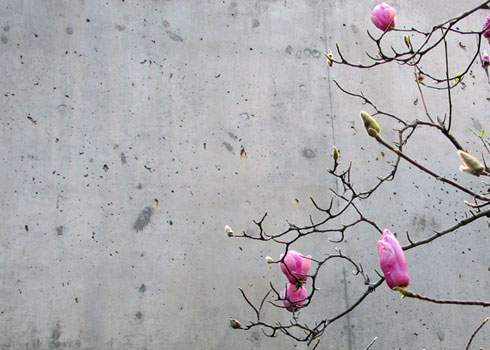One among hundreds of angry days, I took a walk. When one can’t move through, one simply moves. Inertia is a hell realm.
Early February offered its best material. Cloudless skies deepened from the horizon’s powder blue to the stratosphere’s azure. Bare trees etched brown black gray lines in the air. The fooled ones, tenuously tipped, flecked the view with green. In an occasional shady patch, a red bud tree brightened the dim with a foliage fire.
Such gusty days are rare so soon in the year, but that one pushed into evening with gale force. There was considerable resistance to my walk. Irony noted. I pulled my hat well below my earlobes and curled my gloved hands to conserve heat. Between north wind blasts, the birdsong belied the season. They chirped a gospel of new life, of nests being built without apprenticeship or tools, of blind hatchlings to come with no fear of heights or flight.
I thought of nothing in particular. When nothing seems right, it becomes a thick blur of everything. I tried to see what was in front of me, but every momentary glimpse of blade and bud failed to crack through my shadow. On the last quarter of my route, the public golf course left me open to the wind’s full strength. I braced against the muffled sound in my ears as much as the pounding air. Step, step, step. I looked down at the sidewalk. A squirrel took no chances with me and disappeared around a water oak. Dead branches marked the path like runes.
A claw reached out empty and dismembered.
It had belonged to a large songbird—a blue jay, robin, or mockingbird. The four toes stretched wide apart and curved inward. The frozen gesture suggested it had attempted to defend itself, or perhaps locked up in terror. Above the thin gray leg was the meat of its thigh, muscles still moist and blood-filled. Tiny fluffy feathers jutted up from the remaining skin.
Horror.
The sight was fodder for my fury, over a brutal world where harmless, innocent creatures are preyed upon by others, merciless and strong. I thought of what was responsible for leaving the grisly limb. A hawk, most certainly, a Cooper’s or a red-tailed, one I might have seen ride wide-winged in the thermal swirls above the trees near my house. When one landed to rest in a red oak or swamp chestnut, I knew it was there even if I couldn’t see it. The blue jays screamed their air raid calls. The mockingbirds maneuvered steep, swift dives.
There was no peace, no absence of violence, anywhere on earth.
And I was grounded here, with no escape.
The last of my walk was the shadiest. The sun gave light but no heat through the bare branches. I entered the part of the neighborhood’s bike path that had been hit hardest by a recent hurricane. Stumps continued their slow decay where mature trees had once towered. In some places, the equipment used to remove the dead had mangled the soil so much that not even weeds had decided to grow yet.
I approached a Japanese magnolia which had survived storm and saw. Like the others along my walk route, it was covered in the gray-green velvet buds that preceded its post-winter bloom. The weather was still too cold for the flowers to emerge.
Yet there it was—a violet flame, surrounded by its tepals and a sunset nimbus.
Beauty.
Before I stood still near the hidden bloom, I felt a pulse of anger. I am a favorite target of cosmic jokes, and this one was a jaw-dropping knee-slapper.
The violet bud challenged my rage at the world. It defied me to reduce its measure, to deny its role in the balance. This, too, existed in a dark place, no matter the sun rise and set, where cruelty, injustice, and random evil create so much pain. Angry as I was, even at the joke, I could not ignore the message the violet flame gave me.
All is duality. All is a valley that connects light and dark.
I touched the smooth pastel petals curled into their collective warmth. I would miss the stark, simple winter landscape, but I welcomed the effusive scents and colors of spring.
A blackbird flock called to gather itself for the night, the sound of a hundred polished keys slipping into a hundred rusty locks.
What gates do their songs open, I wonder, and behind which one is the end of suffering?
Ronlyn Domingue is the author of The Mercy of Thin Air (Atria Books). The debut novel was a 2005 Borders Original Voices Award Finalist and was acquired in 11 other countries. Currently, she’s at work on her second novel. Visit her at www.ronlyndomingue.com or facebook.






